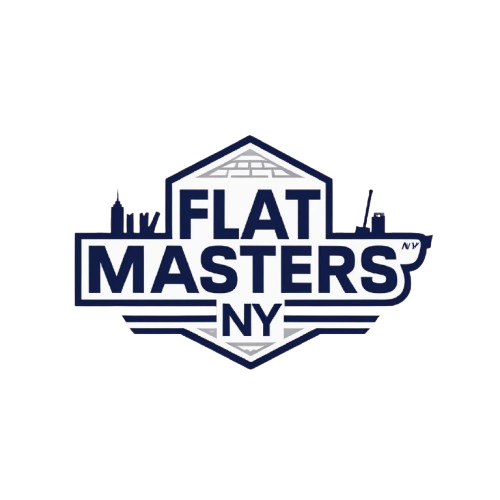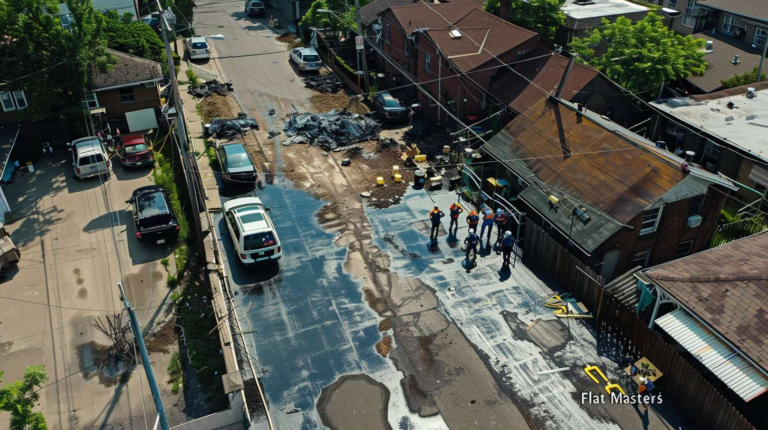What's the Average Cost for Flat Roof Replacement Materials?
Flat roof replacement materials typically cost between $3.50 and $18.00 per square foot, depending on what membrane system you choose. For a standard 1,200 square foot flat roof here in Queens, you're looking at material costs ranging from $4,200 for basic EPDM rubber up to $21,600 for premium thermoplastic systems like TPO or PVC.
Look, I've been installing flat roofs across Queens for over two decades now, and the material choice makes all the difference in both upfront costs and long-term performance. Just last month we replaced three different flat roofs on Northern Boulevard - each owner chose different materials based on their budget and building needs.
Roofing Cost Calculator
Get Your Free Estimate in 5 Simple Steps
Your Estimated Price Range:
Final pricing may vary based on actual conditions.
Get your personalized quote with exact pricing.
EPDM Rubber Membrane: The Budget-Friendly Workhorse
EPDM (ethylene propylene diene monomer) runs about $3.50 to $7.50 per square foot for materials alone. This black rubber membrane has been the go-to choice for flat roofing since the 1960s, and honestly, it's still one of the most reliable options out there.
Here's what you get with EPDM:
- 45 mil or 60 mil thickness options (go with 60 mil - trust me on this)
- 20-25 year lifespan with proper installation
- Excellent resistance to UV rays and weathering
- Easy repairs when punctures happen
The material itself is straightforward - we get our EPDM from Beacon Building Products on Northern Boulevard, and a typical 1,200 sq ft roof needs about 13-14 squares of membrane plus adhesives, seam tape, and flashing materials. You're looking at roughly $4,800-$9,000 in materials for that size roof.
Modified Bitumen: The Middle Ground Solution
Modified bitumen systems cost between $4.50 and $8.50 per square foot for materials. This stuff is basically asphalt with added polymers that make it more flexible and durable than traditional built-up roofing.
We typically install modified bitumen in two layers - a base sheet and a cap sheet. The cap sheet comes in different colors now, which helps with energy efficiency. White or light-colored granulated surfaces can reduce cooling costs by 15-20% during those brutal Queens summers.
Material breakdown for modified bitumen on a 1,200 sq ft roof:
- Base sheet: $1,800-$2,400
- Cap sheet: $2,100-$2,800
- Adhesives and fasteners: $600-$900
- Flashing materials: $400-$700
Total material cost: $4,900-$6,800
TPO Membrane: The Energy-Efficient Choice
TPO (thermoplastic polyolefin) is where costs start climbing - expect $6.50 to $12.00 per square foot for materials. But here's the thing about TPO: it's white, which means serious energy savings. I've had customers see their summer cooling bills drop by 25% after switching from a dark EPDM to white TPO.
TPO comes in different thicknesses - 45 mil, 60 mil, and 80 mil. For commercial buildings or high-traffic roofs, I always recommend 60 mil minimum. The membrane gets heat-welded at the seams, creating watertight bonds that are actually stronger than the membrane itself.
The material quality varies significantly between manufacturers. Carlisle, GAF, and Firestone are the premium brands we use. Cheaper TPO can fail within 8-10 years, while quality TPO from these manufacturers regularly lasts 20-25 years.
PVC Roofing: Premium Performance at Premium Prices
PVC membrane systems run $8.00 to $18.00 per square foot for materials - definitely the high end of flat roof replacement options. But if you're dealing with chemical exposure, grease from restaurant exhaust, or just want the absolute best durability, PVC is worth every penny.
I installed a PVC roof on a medical facility in Astoria back in 2003 - that roof is still performing perfectly today. The heat-welded seams are incredibly strong, and PVC has natural fire resistance that other membranes can't match.
For a 1,200 sq ft PVC installation, material costs break down like this:
- 60 mil PVC membrane: $11,500-$15,600
- Insulation (polyiso boards): $2,400-$3,200
- Cover board: $800-$1,100
- Fasteners and plates: $600-$900
- Flashing and accessories: $900-$1,400
Additional Material Costs You Need to Consider
Don't forget about the supporting materials - they add up fast. Insulation is crucial for flat roofs in our climate. We typically install 2-3 inches of polyisocyanurate foam board, which runs $2.00-$4.50 per square foot depending on thickness and R-value.
Cover boards protect the insulation and provide a stable surface for the membrane. DensDeck or similar gypsum cover boards cost about $0.80-$1.20 per square foot.
Flashing materials are critical but often overlooked in initial estimates. Metal flashing, termination bars, sealants, and fasteners typically add $800-$1,500 to material costs depending on roof complexity.
What About Spray Foam Roofing?
Spray polyurethane foam (SPF) is gaining popularity, especially for retrofit applications over existing roofs. Material costs run $4.50-$9.00 per square foot, but installation requires specialized equipment and training.
The foam provides insulation and waterproofing in one application, then gets coated with elastomeric coating for UV protection. We've had excellent results with SPF systems, particularly on roofs with multiple penetrations or unusual shapes where membrane systems become challenging.
Here's the reality about spray foam though - it's not a DIY project. The chemicals require proper handling, and application conditions need to be perfect. Temperature, humidity, and wind all affect the foam quality.
Regional Considerations for Queens Flat Roofs
Living in Queens means dealing with specific challenges that affect material selection. The salt air from the East River and Jamaica Bay is tough on metal components. We always use stainless steel or hot-dip galvanized fasteners to prevent corrosion.
Our freeze-thaw cycles are brutal on flat roofs. Standing water that freezes expands and can damage membranes over time. That's why proper slope and drainage are critical - and why we often recommend thicker membranes for better puncture resistance.
Snow loading is another factor. While we don't get the snow loads they see upstate, even 12-18 inches can put significant stress on flat roof systems. This influences our fastening patterns and insulation choices.
Material Quality: Why Cheap Options Cost More Long-Term
I can't tell you how many times I've been called to replace "bargain" roofing materials that failed prematurely. That $3.50 per square foot EPDM from the discount supplier might save money upfront, but when it starts failing after 8 years instead of 20, the total cost of ownership skyrockets.
Quality materials from established manufacturers come with real warranties and technical support. When we install Carlisle TPO or Firestone EPDM, there's factory training, approved installation methods, and warranty backing that protects both us and the building owner.
Cheap materials often have inconsistent thickness, poor UV resistance, and manufacturing defects that don't show up until after installation. We've seen off-brand TPO membranes that looked fine during installation but developed stress cracks within two years.
Labor and Installation Factors
While you asked about material costs, installation complexity significantly affects total project cost. A simple rectangular roof with minimal penetrations uses materials efficiently. Complex roofs with multiple HVAC units, skylights, and level changes require more flashing materials and custom fabrication work.
Tear-off costs vary by existing roof system. Removing old built-up roofing with multiple layers can double labor time compared to removing a single membrane. Some projects allow for roof-over installation, which saves on tear-off costs but adds material thickness considerations.
Access is another factor. Ground-level roofs are straightforward for material delivery. Multi-story buildings require crane service or material hoisting, which affects both scheduling and costs.
Getting the Best Value on Flat Roof Materials
The best material for flat roof replacement depends on your specific situation, but here's my general guidance based on 25+ years installing roofs across Queens:
Budget-conscious choice: 60 mil EPDM with proper insulation. Reliable, repairable, and cost-effective for most residential and light commercial applications.
Energy-efficient option: 60 mil white TPO. Higher upfront cost but significant cooling savings over the roof's lifespan.
Premium performance: PVC membrane for chemical resistance, fire safety, and maximum durability.
Retrofit solution: Spray foam over existing roofs where structural limitations prevent tear-off.
The key is matching the material to your building's needs, budget, and expected service life. A warehouse might do fine with EPDM, while a restaurant needs PVC for grease resistance.
Working with Material Suppliers
We maintain relationships with several local suppliers including Beacon Building Products, ABC Supply, and SRS Distribution. These partnerships ensure material availability and often provide better pricing than one-off purchases.
Material delivery timing is crucial for flat roof projects. Most membrane materials need to be stored flat and protected from UV exposure before installation. We typically schedule deliveries for the day before installation begins to minimize storage requirements and material handling.
Quality suppliers also provide technical support and warranty processing. When questions arise during installation, having direct access to manufacturer reps makes a huge difference in project success.
At Flat Masters NY, we've seen material costs fluctuate significantly over the past few years. Petroleum-based products like EPDM and modified bitumen saw major price increases in 2021-2022. TPO and PVC prices have been more stable but still trend upward with inflation.
The bottom line? Quality flat roof materials are an investment in your building's future. Choosing the right system upfront saves money and headaches down the road. We're always happy to discuss specific material options for your Queens flat roof project - just give us a call at (917) 994-7618 to schedule a consultation.


